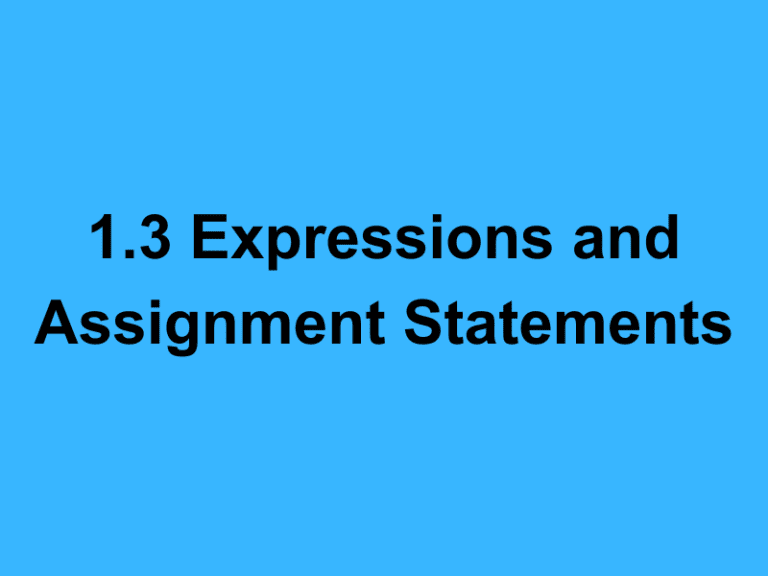Expressions and Assignment Statements in Java
Expressions
An expression is a combination of variables, operators, literals, and method calls, which evaluates to a single value. They enable operations on data and computation of values.
Types of Expressions
- Arithmetic expressions: Perform mathematical operations. Example:
int result = 7 + 3 * 4; - Boolean expressions: Evaluate to true or false. Example:
boolean isAdult = age >= 18; - String expressions: Operations on strings, like concatenation. Example:
String fullName = firstName + " " + lastName;
Operators in Expressions
Operators perform operations on operands (variables or values).
- Arithmetic operators:
+, -, *, /, % - Relational operators:
==, !=, >, <, >=, <= - Logical operators:
&&, ||, !
Assignment Statements
Assignment statements change the value of a variable by assigning it the result of an expression.
variable = expression;Example of Assignment Statement
int total = 0;
total = total + 5;Compound Assignment Operators
Combine an arithmetic operation with an assignment for concise code.
- Addition assignment:
+= - Subtraction assignment:
-= - Multiplication assignment:
*= - Division assignment:
/= - Modulus assignment:
%=
Example of Compound Assignment
int score = 10;
score += 5; // Equivalent to score = score + 5;Increment and Decrement Operators
Java also has increment (++) and decrement (--) operators for adding or subtracting one from a variable's current value. These can be used in a "prefix" form (before the variable, ++var) or "postfix" form (after the variable, var++), which can affect the order of operations in expressions.
Example of Increment and Decrement
int counter = 0;
counter++; // Postfix increment: adds 1 to counter
--counter; // Prefix decrement: subtracts 1 from counterFrequently Asked Questions about Strong Claims in Assignments
What does it mean for a statement to be a "Strong Claim" for an assignment?
+
A strong claim (often the thesis statement in an essay) for an assignment is a clear, specific, and arguable assertion that presents your main point or position. It is not just a statement of fact or a broad opinion. A strong claim takes a definitive stance on an issue or topic and indicates what you intend to analyze, argue, or prove throughout your assignment, requiring evidence and reasoning to support it.
Why is a Strong Claim important in academic or argumentative assignments?
+
A strong claim is vital because it:
- **Provides Focus:** It clearly defines the scope and direction of your assignment.
- **Guides Your Argument:** All your evidence and analysis should directly support this central claim.
- **Engages the Reader:** It tells your audience exactly what they will learn or what position you will defend.
- **Demonstrates Critical Thinking:** It shows you've processed information and formed your own conclusion or interpretation.
Which statement best expresses a strong claim for an assignment?
+
Identifying the "best" strong claim among options involves evaluating them based on criteria like:
- **Specificity:** Is it precise, or too vague?
- **Arguability/Debatability:** Can someone reasonably disagree with it? (If not, it might be a fact).
- **Focus:** Does it cover too much, or is it manageable for the assignment length?
- **Clarity:** Is the meaning obvious?
- **Alignment:** Does it directly address the assignment prompt?
In this context, is "assignment" referring to a programming concept ("assignment statement")?
+
Based on the query about "strong claim," "assignment" here most likely refers to an academic task (like writing an essay or paper) rather than a programming concept (like assigning a value to a variable, which is often done with an 'assignment statement'). The term "statement" in "strong claim" refers to a declarative sentence used to make an assertion or argument in writing.

